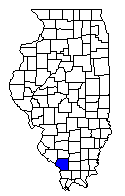
FREEMAN KING is a fine old veteran of the Civil war and, while he passed
the greater portion of his life time as an agriculturist, he has been a
guard at one of the important stations of the Chester prison for the past
four years. He is all but a native of Illinois, having been brought to this
commonwealth from Somerset county, Pennsylvania, in April, 1841. His birth
occurred on the 13th of September, 1840, and his life was spent in the pure
air of the country about Murphysboro until his addition to the prison
service at Chester in 1907.
Mr. King's father was Charles King, who
died in Jackson county, Illinois, in August, 1842, at the early age of
twenty-eight years. He was likewise a native of the old Keystone state of
the Union, was of Pennsylvania German stock, and was married in Somerset
county, Pennsylvania, to Miss Mary A. Whipkey, also of German descent.
Freeman King was the only child of his parents to reach years of maturity,
and after his father's death his mother married Peter Bowlby. Of the
children born to the latter union those surviving are: Winfield Scott, .of
Jackson county, Illinois; Emma I., wife of Benjamin Harris, a farmer near
Murphysboro, Illinois; and Peter Grant, of Oklahoma. Mrs. Bowlby passed away
in 1866, after seeing her children reach ages of personal responsibility and
her oldest son acquit himself with honor and distinction as a volunteer
soldier in the preservation of the Union during the Civil war.
Under
the invigorating discipline of the old homestead farm Freeman King was
reared to maturity and his early educational training consisted of such
advantages as were afforded in the subscription schools of the period and
locality. When he had reached his majority and was thinking seriously of
assuming his station in life as a citizen the rumblings of a national war
were to be heard. The politicians of the south had brought about the
secession of states and the result was the call for volunteer soldiers
issued by President Lincoln. Freeman King immediately gave evidence of his
loyalty to the cause of the Union by enlisting as a soldier in Company K,
Eighteenth Illinois Volunteer Infantry, at Anna, Illinois, and was soon in
the field upon the mission of enforcing peace. His captain was D. H. Brush
and his colonel M. K. Lawler, of Shawneetown, and the regiment formed a part
of the Sixteenth Army Corps, once commanded by General John A. Logan, with
whom Mr. King was on "fishing" terms of intimacy. The command entered active
service at Fort Henry, then helped capture Fort Donelson and proceeded
thence to Shiloh. After the latter engagement the Eighteenth Illinois
returned to Jackson, Tennessee, where it received orders from the war
department and was placed in the Mississippi Ram fleet, subsequently termed
the "Marine Brigade." Mr. King participated in all the activities of his
regiment, and the little fleet to which he belonged was standing by when the
Federal fleet attacked Vicksburg. Mr. King had enlisted as a private but
received his honorable discharge from service, at Springfield Illinois, in
June, 18j64, as a sergeant. He had spent some three years in the service of
his country and at the end of that time was ready to assume the
responsibilities of civil life. He turned his attention to farming on the
old parental estate, two miles distant from Murphysboro. Illinois, and there
continued to live and prosper until 1907, when he entered the service of the
state prison at Chester. He holds the position of guard at one of the
important stations of the prison and, while he is now somewhat advanced in
years, his military experience and splendid constitution make him well able
to cope with the responsibilities devolving upon him.
In politics
Mr. King has ever been allied as a stalwart in the ranks of the Republican
party and for sixteen years he was a member of the Jackson county central
Republican committee. He was elected a member of the boards of supervisors
of two different townships of the county and served in that capacity for
several years. He was also a delegate to a number of important county and'
congressional conventions and so had a voice in the selection of candidates
for public office. In a fraternal way he is -a Master Mason and an Odd
Fellow. He retains a deep and sincere interest in his old comrades in arms
and signifies the same by membership in Murphysboro Post, No. 132, of the
Grand Army of the Republic, being past commander of his post. He is a man of
sterling integrity and worth and no citizen of this Action of the state is
more highly honored and esteemed than he.
Mr. King has been twice
married, his first union having been to Miss Catherine Butcher, who bore him
two sons, Charles W. and E. Edward, both farmers near Oraville, Illinois.
Mrs. King was summoned to the life eternal, and in 1879 Mr. King wedded Mrs.
Rebecca Reno, who has also passed away. Two daughters were born to the
latter union, namely, Lizzie, who is the wife of Harry Creath, a farmer in
Jackson county, this state; and Ella, now Mrs. Joe Bastian, of the vicinity
of Oraville, where her husband is a farmer.
Extracted 15 Jan 2018 by Norma Hass from 1912 A History of Southern Illinois, volume 2, pages 942-943.
Randolph |
Perry | Franklin |
Perry MO |
 |
Williamson |
| Union |


